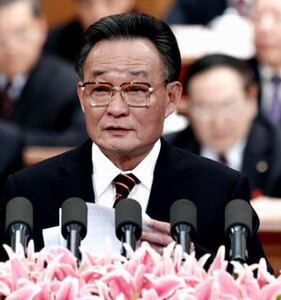Socialist legal system takes shape
China's top legislator Wu Bangguo said Tuesday that the top legislature would ensure the goal of formulating a socialist legal system with Chinese characteristics be achieved by the end of this year as scheduled.
The goal is the "bounden duty" and "primary task" of the National People's Congress (NPC) this year, Wu said in a report on the work of the NPC Standing Committee delivered at the ongoing annual NPC session.
|
|
|
Wu Bangguo, chairman of the Standing Committee of the National People's Congress (NPC), delivers a work report of the Standing Committee of the NPC during the third plenary meeting of the Third Session of the 11th NPC at the Great Hall of the People in Beijing, capital of China, March 9, 2010. [Xinhua] |
Wu, chairman of the NPC Standing Committee, said the legislature would promptly formulate new laws, revise some existing laws, and make legislation more scientific and democratic, in order to meet the goal set at the 15th National Congress of the Communist Party of China.
He also promised to supervise and guide efforts to sift through administrative regulations and local statutes, and improve the filing and examination of normative documents.
A socialist legal system with Chinese characteristics has been basically established and there are now laws that cover almost every area of China's economic, political, cultural and social activities, Wu said.
However, he noted that rapid economic and social development continue to place new demands on China's legislative work.
In the past year, an important item on the committee's agenda was revision of the Electoral Law.
The amendment proposes electing deputies to people's congresses based on the same population ratio in urban and rural areas and assures an appropriate number of deputies from every locality, ethnic group, and sector.
Wu said the amendment, which has been submitted to the ongoing NPC session for deliberation, better embodies the principle that "all people, all localities, and all ethnic groups are equal."
The NPC Standing Committee also intensified legislative input on a green and low-carbon economy in order to address climate change, Wu said.
It revised the Law on Renewable Energy, which further defined the main content and principles for formulating plans to develop and use renewable energy.
The committee also enacted six laws in 2009 on tort liability, settlement of land disputes, national defense mobilization, the armed police force and others.
This year, one major legislative task for the committee is to finish deliberating and revising the draft Social Security Law, a major issue that has drawn wide attention as it affects hundreds of millions, Wu said.
The draft law allows workers to transfer their basic old-age insurance accounts from one locality to another. It also stipulates that the state would gradually set up a new satisfactory old-age insurance system for rural residents.
Other major legislative efforts underway include deliberation of the draft Law on Administrative Enforcement and the draft amendment to the Law on State Compensation, which, respectively, clarifies the set limits of authority and the administrative enforcing bodies, and makes it easier to seek compensation.
The draft amendment to the Organic Law of Villagers' Committees, also under deliberation, mainly revises and supplements provisions in order to improve procedures for electing and dismissing members of villagers' committees.
Last year, the top legislature repealed eight laws and decisions on related legal issues, revised 141 clauses of 59 laws, and identified a number of other laws that clearly need to be revised, Wu said.
 0
0 







